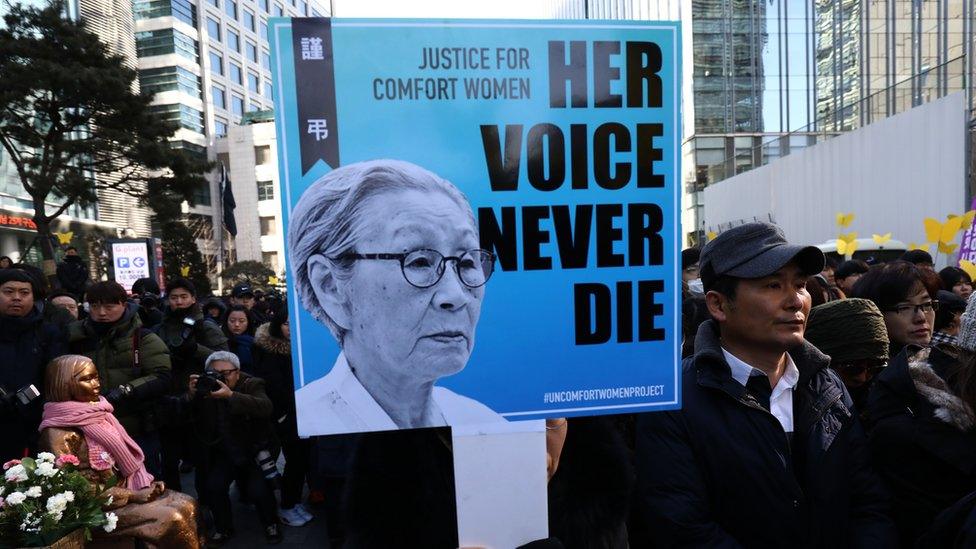Tokyo 2020: Why some people want the rising sun flag banned
- Published
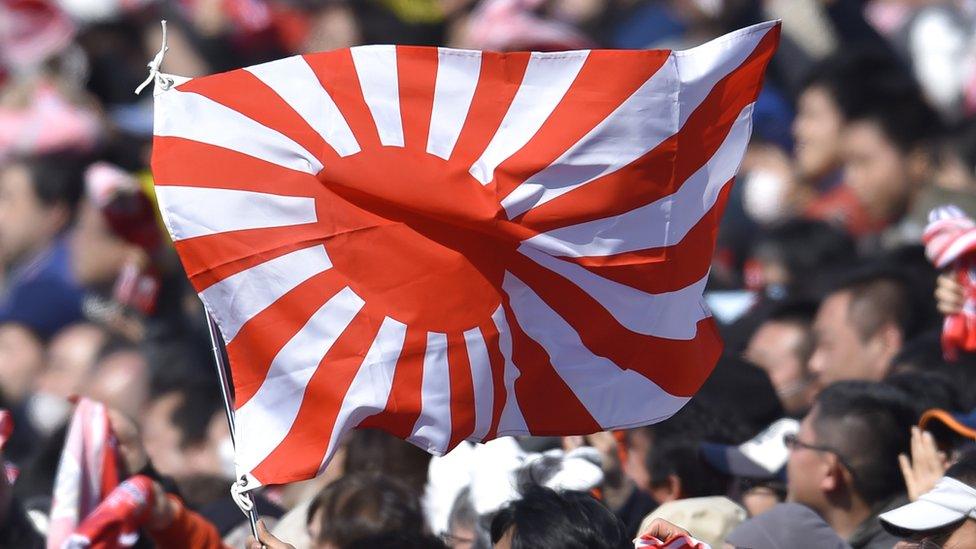
Just a flag - or a symbol of imperial terror?
Fans cheering in a stadium and waving a flag is a staple sight at any international sports event.
But what if a flag is so offensive to some countries it sparks a whole movement to get it banned?
That is what's happening with Japan's rising sun flag and the Tokyo 2020 Olympics. And the strongest criticism is from South Korea - where some politicians even compare it to the Nazi swastika.
Critics say the flag is flown by fans who want to romanticise and rewrite the human rights abuses by Japanese forces.
South Korea wants it banned at the games - but the 2020 organisers say the flag, external is "widely used in Japan" and is "not a political statement".
What is the rising sun flag?
Japan's national flag is simply a red disc on a white background - and no-one has a problem with that one.
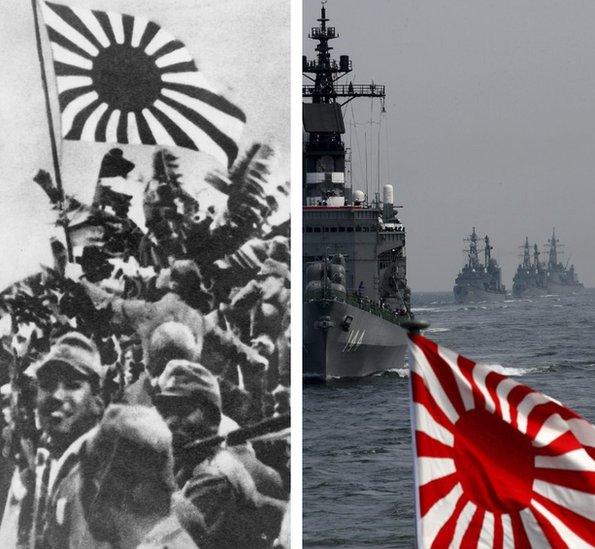
Japanese soldiers during WWII and the country's modern-day navy
The rising sun flag has a similar red disc but with 16 red rays coming from it. Both flags have in fact been used for a long time, dating back centuries.
During the 19th Century, the rising sun symbol became the flag of the military. As such, it was flying during Japan's imperialist expansion when it occupied Korea and part of China.
During World War Two, it became the flag of the navy - and that's largely where it got its controversial reputation. Japanese troops occupied much of Asia during the war, carrying out atrocities against local people.
Today, it's still the flag of the country's navy and a slightly different version is used for the regular military.
Why is South Korea unhappy with it?
In 1905, Japan occupied Korea as a protectorate, and five years later as a full-fledged colony.
The Japanese rule was one of economic exploitation and hundreds of thousands of Koreans were pressed into forced labour to aid the Japanese expansion in other parts of Asia.
The brutal regime also saw thousands of girls and young women forced to work in military brothels set up for Japanese soldiers before and during World War Two.
Known euphemistically as "comfort women", they were forced into sexual slavery. Aside from Korean victims, the Japanese army also forced girls from Taiwan, China and the Philippines into the brothels.
Many South Koreans associate the rising sun flag with a long list of war crimes and oppression - and see Japan's continued use of the symbol as emblematic of Tokyo's failure to address its past.

These Korean women were found by US Marines at a "comfort station" in Okinawa in April 1945
The flag is "one thread in a tapestry of other South Korean complaints regarding Japan's perceived inability - or unwillingness - to accept responsibility for colonial transgressions," explains Korea analyst Ellen Swicord.
South Korea's foreign ministry has described the flag as a symbol of Japanese "imperialism and militarism".
Meanwhile, a parliamentary committee for sports said it was "akin to a symbol of the devil to Asians and Koreans, just like the swastika is a symbol of Nazis which reminds European of invasion of horror".
Why no protest from China?
Based on a historical experience of Japanese invasion, China's reaction to the rising sun flag at the Olympics could be similar to South Korea's.
After the Japanese military took the Chinese city of Nanjing in 1937, Japanese troops embarked on a months-long campaign of murder, rape and looting in what became one of the worst massacres of the war.
According to Chinese estimates, around 300,000 people were killed, many of them women and children, and around 20,000 women raped. Yet there's little protest from China about the flag.
The reason is simple politics, explains Prof David Arase, from the Nanjing campus of Johns Hopkins University.
Chinese media is state-controlled and Beijing is currently working to improve ties with Tokyo. In fact, Chinese President Xi Jinping is planning to visit Japan in the spring to meet the new Japanese emperor.
"That means China does not make a big issue out of it, and hence people wouldn't be primed for any outrage over that flag," Mr Arase says.
Is it comparable to the swastika?
There are arguments for and against.
The rising sun flag has been used as a traditional national symbol of Japan for centuries, and appears in advertisements and on commercial products.
In Germany, the swastika was only used when the Nazis were in power. It is now banned in Germany, and the Nazi symbol is only used by extremist groups.
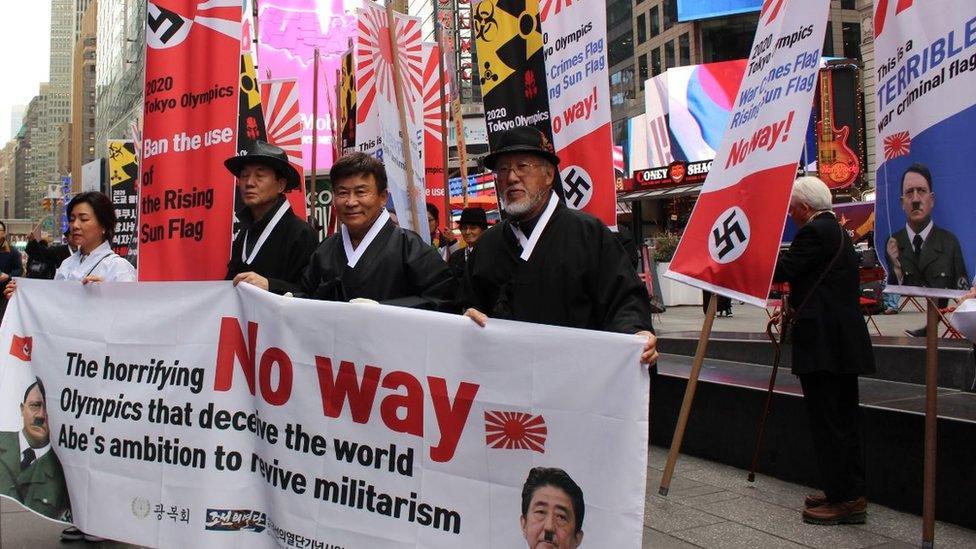
Yet even though the rising sun flag has a longer history, "no-one in Japan uses the rising sun flag for any purpose other than romanticising and rewriting the horrible human rights abuses committed under the Japanese empire," argues Koichi Nakano, professor of political science at Sophia University in Tokyo.
He suggests a better comparison than the swastika is the Confederate flag in the US. That flag was used in the American civil war by southern states that wanted to keep slavery.
The flag is not banned, and is still flown across southern states, but critics say it is a symbol of racial segregation - and perceived superiority.
Why won't Japan ban the flag?
Despite pressure from South Korea, there has been no concession from Japan so far.
There is even an explanation by the foreign ministry, external, which looks at the overall history of the flag without any references to its role during World War Two.
"The design of the rising sun flag is widely used throughout Japan, such as 'good catch' flags used by fishermen, celebratory flags for childbirth and seasonal festivities, and flags of Japan Maritime Self-Defense Force vessels.
"Claims that the flag is an expression of political assertions or a symbol of militarism are absolutely false."
In fact, even Japan's liberal newspaper Asahi Shimbun has a version of the flag as its logo.
Is this a political move?
Japan's reluctance comes at a time where relations between South Korea and Japan are at a new low.
Over the summer, a diplomatic feud over wartime labour compensation snowballed into a full-blown trade row between the two sides.
A man smashed up his Japanese-made car in protest at the trade dispute
Prime Minister Shinzo Abe's refusal to act is seen by some as an attempt to please an ultra-conservative faction.
"The current Japanese government is letting extreme nationalism to carry on and is tacitly supporting its expression," explains Harrison Kim, assistant professor in history at the University of Hawaii.
Yet Japan's alleged inability to properly deal with its brutal imperial past "is not the fault of the Japan alone", he says.
Rather, it's in part because the US sought to secure Tokyo as an ally during the Cold War.
"The Japanese government did not have to resort to reparations and redress that would appropriately deal with its own past," says Mr Kim.
The result, he argues, is that Japan has not implemented a permanent way of "memorialising and apologising for its imperial crimes - not in law, not in education, and not in culture".
- Published2 December 2019
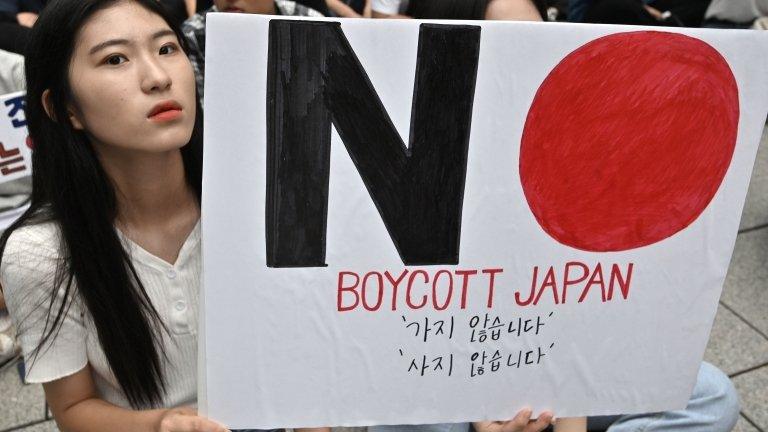
- Published3 February 2019
